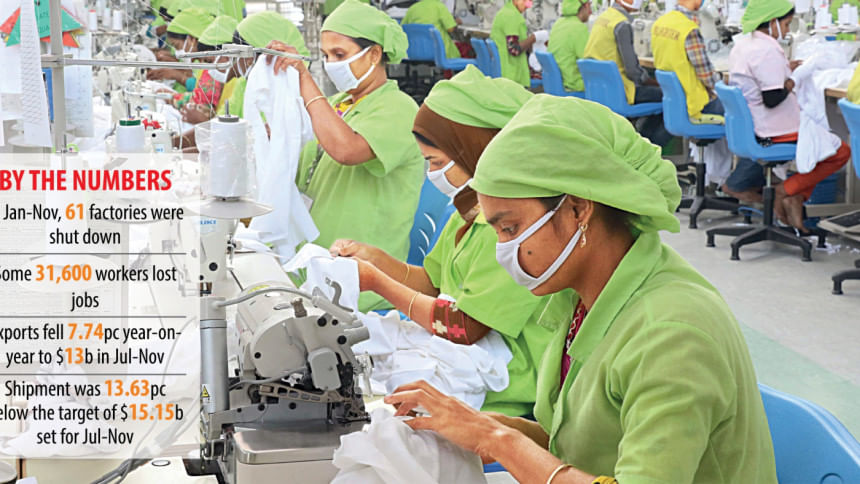Double trouble for RMG

The garment sector is facing a double whammy as more and more factories are closing at a time when apparel shipments are falling.
Between July and November, garment exports declined 7.74 percent year-on-year to $13.08 billion, which was 13.63 percent below the target set for the period, according to data from the Export Promotion Bureau (EPB).
In the last 11 months to November, 61 factories were shut down, rendering 31,600 workers jobless, according to data from the Bangladesh Garment Manufacturers and Exporters Association (BGMEA), the trade body for apparel makers and exporters.
On the other hand, Bangladesh’s main competitor Vietnam reaped nearly $27.4 billion from exporting garments and textiles in the first 10 months of this year, posting a year-on-year rise of 8.7 percent, according to the country’s General Statistics Office on Tuesday.
Stronger currencies and policy incentives given by the competitor countries are enabling them to get more business by offering lower prices than Bangladesh, according to the exporters and analysts of the BGMEA.
A significant increase in production cost because of the implementation of the minimum wage in December last year is another major reason for the falling garment export, they said.
Poor efficiency and relatively higher cost of doing business are decaying Bangladesh’s trade competitiveness.
Over-concentration of the industry to a few product items and to a handful of markets are among the top-rated challenges, the leaders of the garment makers’ platform said.
“As we are tracking export data on monthly basis, the trend is still giving a dull picture,” said Rubana Huq, president of the BGMEA.
The data of the first fortnight of December showed that exports declined by more than 3 percent, meaning the growth may continue falling in the whole month, she said.
It is difficult to project the trend since the global market looks volatile due to the emergence of a number of factors such as the EU-Vietnam free trade agreement, the strategic move by China to offset the impact of punitive tariff by lowering prices, and the emergence of new sourcing destinations, according to Huq.
“The growing share of online sales will also bring a major disruption to the conventional way of doing business in the medium term. If we do not take proper steps now to get ourselves at par with our competitors, it will be difficult to get the rhythm back in our exports.”
The probable fallout could be closure of more factories, displacements of more workers and a decline in export earnings, which might affect the overall macro-economic performance of the country, she said.
“We have appealed to the government for a few policy support to tackle the crisis.”
The government also responded and lowered the source tax on garment export to 0.25 percent.
“However, we have demanded for the retrospective effect of it like previous years,” Huq said.
“At the same time we have requested for withdrawal of the conditions to avail the 1 percent special incentive and also for withdrawal of tax on incentives.”
She said since the exchange rate has become a major downside of the country’s competitiveness, the BGMEA hopes the government will be considerate to allow a premium—for example, Tk 5 per US dollar on 25 percent of export value—on the local retention on garments exports.
According to Huq, diversification of the industry is one of the most important priorities now and the sector needs special incentive to encourage product and material diversification and innovation.
“For long-term business sustainability, we need an exit policy.”
Ahsan H Mansur, executive director of the Policy Research Institute of Bangladesh, argued for a temporary devaluation of the taka against the US dollar for some selective exportable garment items.
For instance, the government can devalue the greenback for the manmade fibre garment and synthetic fibre garment exports, he said.
If the government devalues the local currency against the dollar for selective items, product diversification will take place automatically, he said.
Mansur also said the taka can be devalued to Tk 90 against a US dollar right at this moment. However, the government should also notice whether the inflation goes up due to the devaluation of the currency, he said.
“Currency devaluation is not a permanent solution,” he said.
The garment industry has to increase its efficiency at least by 30 percent if it wants to be more competitive globally, said Mansur, also a former economist of the International Monetary Fund.
“The sector can obtain efficiency through efficient management practices, technology selection and product and market diversification.”

 For all latest news, follow The Daily Star's Google News channel.
For all latest news, follow The Daily Star's Google News channel. 







Comments